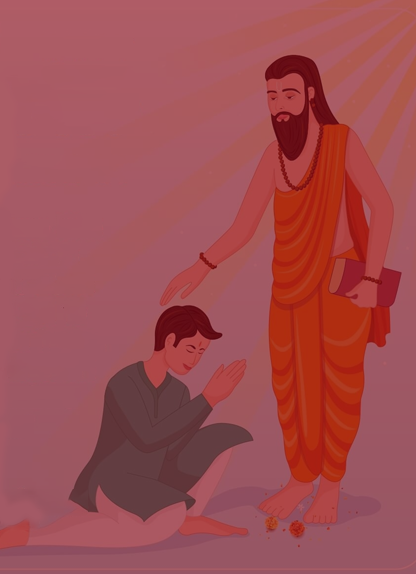Chapter V-6. But renunciation, O Mighty Armed Arjuna, is hard to attain without (Karma) Yoga. The Yoga-harmonized sage goes quickly to Brahman.
The word, which is translated as sage, is Muni, which comes from the sense of one who mediates on the real nature of God (Shankaracharya). The commentators here suggest that in this case Brahman means renunciation, consisting in Knowledge of the Self – the Absolute unified. For most of us it is hard, near impossible to give up our relations, actions, and place in the world, to renounce our sense of doership. If we begin by offering our actions as worship and giving up any fruits, our daily life becomes a journey with God ever-present. We will then become peaceful and quickly become unified into the Brahman, the state of recognition of the Divine permeating all. It is easier to remember God when we are not intently following a "plan" and instead wait expectantly, taking radical refuge in God – like a leaf in the wind or a child in the ocean trusting the parent.
Karma Yoga begins as worship and offering all fruits to God and is purified to obedience when the doer does all for the benefit of all creatures as encouraged in all scripture and religious teachings. Radical obedience is when one comes to experience that all work of the body is done by nature and all is God's; any personal longing or desire is destroyed. "I am Thine, All is Thine, Thy will be done."
Chapter V-11. The Yogis, having abandoned attachment, perform action, through the body, mind, intellect, and even by the senses for the purification of themselves.
Yoga is the ability to separate the True Self from the movements that we mistakenly think of as I. The intellect evaluates what the mind perceives from the senses and by the action of the Gunas. Nature causes the body to act. Attachment or desire binds one to this illusive nature. Acting without a sense of personal doership, egoism or desire for fruits purifies and lets the self become aware of the Light of the Self.
Chapter V-21. With the self unattached to external objects, he finds happiness in the Self. We the self engaged in the meditation (Yoga) of Brahman, he attains endless happiness.
Yoga leads to total harmony resting in the Atman (higher Self) where the illusion of separation is gone and only the cosmic unity remains; one is freed from attachment to external objects – the cause of sorrow. There remains only the steady happiness from deep meditation as the boundary drops between external and internal so there can be only the simple comfort of the reality of the Divine Bliss.
Chapter V-24. He who is happy within, who rejoices within, and who is illuminated within, that Yogi attains absolute freedom – becoming Brahman.
God is one, permeates everything, and yet is beyond everything. We neglect this great Truth and look here and there for pleasure and happiness. Yoga brings us back to the interior reservoir of bliss and joy, illumination from the light within. Once we experience that centered peace, we become free of the compulsion to experience happiness from the outside. We attain to the intuitive connection, yes very identity of ourselves with the God, we have previously known only intellectually through our faith in the Ultimate Reality.

